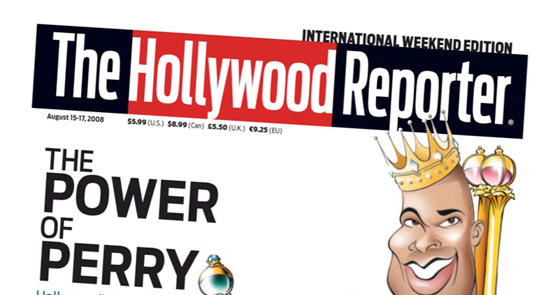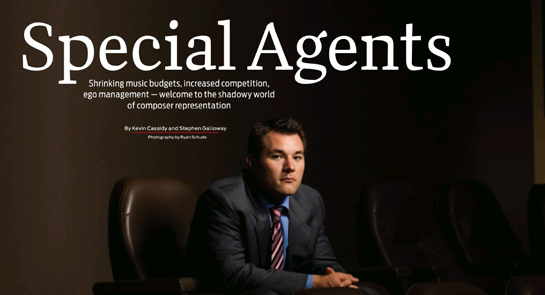Special Agents

The Hollywood Reporter’s article on music composer agents offers an interesting insight into today’s world of film music, including comments from my dear friends Seth Kaplan and Christine Russell of Evolution Music Partners and also… it talks about my first steps in Hollywood.
Read the whole article below or see it on THR.
Inside music composer agents
By Kevin Cassidy and Stephen Galloway
Aug 14, 2008, 03:55 PM ET

(ICM’s Tad Lumpkin)
A producer had asked Kraft’s composer client to write a “very Hitchcockian, Bernard Herrmann-type score” for his production, but the composer was leaning toward something sparser. The producer was adamant: “I want wall-to-wall music,” he said, “just like in ‘The Birds.'”
And there lay a snag. “He managed to pick the one Hitchcock film that had no music in it,” says Kraft.
By the time the agent had finessed the matter, it was too late: The producer realized music was the least of his problems and had to reshoot a good chunk of the picture.
Welcome to the world of the film music agent, a world that involves an unusual blend of knowledge and art, of cajoling and diplomacy.
It is work that differs subtly from that of other agents. Music agents tend to know far more about their clients’ art, they have operational skills that often resemble a producer’s, and they frequently develop intense relationships with their clients, much like managers.
While a number of gargantuan agencies are at the heart of the entertainment business as a whole, “the representation of film composers is dominated by smaller agencies who don’t represent a lot of other creative talent,” says Seth Kaplan of Evolution Music Partners. “The larger agencies may have a composer or two, but the dominant force in our little niche is the specialized agencies.”
Those specialized agencies include Kraft-Engel Management, First Artists Management, the Gorfaine/Schwartz Agency, Greenspan Kohan and Soundtrack Music Associates, among others. Their history is full of intertwined relationships, rivalries and conflicts — exacerbated by the narrow world in which they operate.
One agent dismisses two rivals by saying, “They’re both nuts”; he notes of a competing company, “They could be selling widgets.” Another agent is known to have sabotaged a former colleague by badmouthing him to all his clients. These agents may be friendly on the surface, but the competition between them is intense.
That’s partly because so many have worked together at different times. Take Kraft: Recognized as the most knowledgeable about music among his peers, he taught film music and worked for a soundtrack label before joining ICM in the 1980s. When ICM decided to exit the film composer business in the early 1990s, Kraft went out on his own.
Later, he was teamed in Blue Focus Management with veteran agent Vasi Vangelos, who then formed his own company, First Artists, in 2003.

You can’t make it as a flake or an egomaniac. There are enough flakes and egomaniacs in the business in general, and nobody’s going to let the composer or his agent be one of them. You want to be a narcissistic jerk? Take a number.”
— Richard Kraft, with Laura Engel, of Kraft- Engel Management
While these are the major players in film music, the big agencies still have plenty of clout. ICM is back in the game, and agent Tad Lumpkin — who represents a roster of writers, producers and directors, as well as such composers as Paul Cantelon (“The Diving Bell and the Butterfly”) and Mateo Messina (“Juno”) — says there are advantages to being with a powerhouse.
“At a full-service agency that represents all kinds of talent and filmmakers, you see projects move from idea to the finished phase,” he argues. “Being involved in a project that long really gives you (the chance) to get a composer an opportunity.”
If ICM and CAA are kingpins in the larger world, Gorfaine/Schwartz is the most prominent composers agency. But the company, which once stood unrivaled (rather like CAA in the ’90s), is facing greater competition today.
“There is more of a balance of power than there has been for a while,” one competitor notes. “Today they are the largest, but they’re not alone.”
Gorfaine/Schwartz’s strength has been bolstered by the fact that it represents Hans Zimmer, “the most important person in this business, without question,” according to one rival agent. “That is how Gorfaine/Schwartz maintains most of its power, because Zimmer uses a group of other composers to collaborate on the scores that he is doing and has a whole team of people that work for him,” and that in turn leads to a higher volume of business for the agency. (The agency’s Sam Schwartz declined to comment.)
Zimmer has not yet been “poached.” But agents are increasingly aware of how easy it is for their clients to be stolen.
“Any time one of my clients gets a major job, I can depend on the fact that (another agent) will be calling. Luckily our clients value our hard work and stay loyal,” Kaplan notes.
Kaplan’s partner, Christine Russell, says months of work can go into securing a big job.
“I worked for seven months to get Mark Kilian the job as composer on (Overture’s upcoming release) ‘Traitor,'” she says. “When he got it, I thought, ‘F***in’ A!’ When you know somebody’s really right for something, you do push harder, and sometimes you have an instinct that a certain client would work well with a particular director, even if there’s not a specific project at hand. In those cases, I will try to create an opportunity for those two people to meet. It always pays off.”
It also pays off these days to stand out as a composer, and the best way to do that, according to the Agency Group’s Linda Kordek, is to be willing — and able — to work in a broad range of styles.

When you know somebody’s really right for something, you do push harder, and sometimes you have an instinct that a certain client would work well with a particular director. In those cases, I will try to create an opportunity for those two people to meet. It always pays off.”
— Christine Russell, Evolution Music Partners
“It’s really critical right now that a composer have a signature sound,” says Kordek, whose roster includes Jonathan Goldsmith (“Away From Her”), Susan Marder (TNT’s “Saving Grace”) and songwriter Joe Jackson. “A film composer needs to be able to compose music in all genres and all styles — that’s part of the job description.”
Anita Greenspan of Greenspan Kohan Management adds that while talent and versatility are certainly vital, a strong head for business doesn’t hurt.
“The most successful composers in our business — and I’m not saying the most talented, I’m saying the most successful — are the ones who are good businessmen first,” she says. “That said, I love the tortured artist. I’ve got one guy who is outgoing, but the rest of them shy away from rooms full of people or act so bizarre they need their behavior explained. Sometimes I have to ask, ‘What the hell did you do that for?’ The one that’s the most unpredictable and the one you don’t want to let loose on a crowd of people is probably my husband (Mark Mothersbaugh)! But they all have to have at least some business acumen and not get their egos bruised. They have to remember it’s not personal.”
As for the economics of the boutique agencies, unlike the majors, which take a standard 10% of their clients’ income, music agents’ fees are individually negotiated and tend to range from 10%-15%, akin to managers’ fees. That is in part because their work covers an array of tasks not handled by regular agents.
Composers can be paid either a “package” fee or a simple “creative” fee for composing. The package fee covers the hiring of musicians and other producing aspects that agents often become involved with.
“We are very involved in the process of assisting composers in the booking of everything they need, so that the composer can concentrate on writing the music,” says Maggie Rodford, managing director of Air-Edel Associates. “With an actor’s agent, everything is taken care of by the production.”
“We’re full-service problem solvers, involved in every phase of the game,” adds Kraft’s partner Laura Engel. “You don’t just book a film for somebody and move on.”
That’s apparent from a glance at agent John Tempereau’s schedule this year. Tempereau, a senior partner with Soundtrack Music, has already been to Beijing — not because of the Olympics, but because three of his clients have been working there. “I was there to support (them),” he says.

The most successful composers in our business — and I’m not saying the most talented, I’m saying the most successful — are the ones who are good businessmen first. They all have to have at least some business acumen and not get their egos bruised.”
— Anita Greenspan, with Neil Kohan, of Greenspan Kohan Management
Evolution’s Kaplan showed the same kind of international reach when he first heard about composer Abel Korzeniowski.
Korzeniowski, while living in his native Poland, had heard about Kaplan and sent him a CD. When the agent listened to his music, he was stunned by its quality — but going from that to handling Korzeniowski as a client was a whole other matter.
“We had to get him a visa,” Kaplan recalls. “One of our clients was good enough to say he would give him work. But it took us eight months to get him out here.” Within weeks of his arrival in Los Angeles, Korzeniowski had his first American project, HBO’s “PU-239.”
If Kaplan and Tempereau are turning their attention overseas, that is no coincidence. Both are dealing with a business that is facing serious economic challenges as studios make fewer films and work for their clients becomes more scarce. Stagnating music budgets have radically changed the dealmaking dynamic.
“More than ever, it’s a battle,” says Robert Messinger of First Artists Management, whose clients include Michael Brook (“Into the Wild”), Philip Glass (“Notes on a Scandal”) and Gustavo Santaolalla (“Babel”). “It’s very tough right now to get fee increases. On some films it’s still possible. But on many the producer or the studio will just come to you and say, ‘This is what we have. Who will do it for this fee?'”
“There’s just not the negotiating that there has been in the past,” adds Greenspan. “It used to be that a studio would call and say, ‘We’re interested in so and so — what is his fee?’ You’d quote the fee, and hopefully you’d settle somewhere around there, a little higher than the last time the composer worked. Now we get the calls that say, ‘This is how much we have.'”
“There has been a 15%-20% downward turn (in fee amounts) over a five-year period,” notes Rodford, “and given that normally most things go up, that becomes quite an interesting conundrum.”
Rodford cites one recent indie film in the $15 million-$20 million budget zone as an example.
“In an ideal world, we would have wanted an overall (music) budget of $600,000,” she explains, “but the budget allocated was in the realm of $75,000. The producers sadly had been told they could get the music for that.”
If the difficulty of financing independent films has a direct impact on salaries, so does the reduced number of major studio films. In the not-too-distant past, it was standard for A-list talent on a blockbuster film to earn a creative fee of $1 million-$1.5 million, while the fee for a midrange major release might fall between $500,000 and $700,000. Not anymore.

More than ever, it’s a battle. It’s very tough right now to get fee increases. On some films it’s still possible. But on many the producer will just come to you and say, ‘This is what we have. Will you do it for this fee?'”
— Robert Messinger, First Artists Management
While top-echelon composers like Zimmer and James Newton Howard can still earn fees of up to $2 million for these pictures, many of the non-superstars are accepting pay cuts to keep working. That, in turn, is impacting the lesser-known composers on the tier below.
“It is more competitive,” says Kaplan. “A composer who has done his first or second studio movie and who is making $250,000-$500,000 on a picture is seeing all of these composers who were at a higher income level coming down and taking those films because there are fewer films available in the higher bracket.”
He adds, “People in the upper strata don’t have enough upper-strata movies to keep them busy, and that puts pressure on and limits the opportunities for up-and-coming composers.”
The pressure increased this year with the WGA strike, and it could get worse if the SAG also strikes. All this will not just impact composers: “It is hurting the music editors and postproduction people, too,” says Tempereau.
Fewer opportunities have led some agents to shed clients who are not working — though there is more work in certain areas, even if there is less in film.
“Television has remained healthy, and the rise of other markets such as video games has helped,” Tempereau says. “When the film business does come back, the good news is these other areas are still going to be there.”
Until then, the pressure on the agents is only going to increase. It is, as one agent says, a buyer’s market.
For any composer who thinks his agent can protect him — as Kraft did with the Hitchcock-loving producer — that may be wishful thinking. Now, for any prospective client, he has advice that is tougher than it might have been just a few years ago.
“You can’t make it as a flake or an egomaniac,” he says. “There are enough flakes and egomaniacs in the business in general, and nobody’s going to let the composer or his agent be one of them. You want to be a narcissistic jerk? Take a number.”
Chuck Crisafulli contributed to this report.
August 2008
Comments
7 Responses to Special Agents
Reply
 Twit this!
Twit this! on Facebook
on Facebook
I am a composer of music and words in piano and singer in playing and
singer sheets and I want to have an agent. I can postal mail this to you to see if you can be my agent with it, Email me about this and
write your postal mail address.
Hello,
My name is Brian Thomas Lambert and I am looking for an agent. For the most part projects have found me. I am now looking for representation.
I have scored and performed a few features distributed by Universal and 13 commercials currently playing in Vegas selling art products from Warhol to Picasso.
I am very good at many genres. You can see and listen to my work at http://www.hiddenstory.com. Select HEAR MY MUSIC AND WATCH VIDEO CLIPS.
You can also google my full name.
Thank you for your time.
Best,
Brian
Hiddenstory Productions
http://www.hiddenstory.com
323-309-8593 cell
323-222-8555 office
Dear sir or madam,
My name is maria and I am from Greece. I am musician and composer and I have some pieces here : http://www.soundcloud.com/m-boua, I would like to plisten to them and tell me your opinion, I am looking for a manager :) thank you
maria
Hello,
I am musician jazz artist and composer for films music. Already I am signed with Music On Mack Avenue from Los Angeles and their music library where they licensed over 70 my works.
I have not exclusive agreement with them and I am free to cooperate with other people as music supervisors and agents. Actually I looking for personal agent who will offer my soundtracks themes in films project.
Please check links below where you can listen some my works. I really respect your abilities and skills in films composer representation so will be great to give me your opinion about what I compose and possibilities to collaboration.
KInd regards,
Bobi Serafimovski
Bobi Serafimovski
Professional composer
Macedonia – Europa
+389 (0) 77 60 82 62 cell
US PHONE NUMBER: (713) 931-0853
Skype contact: b_serafimo
http://www.sonicbids.com/2/epk/default.aspx?epk_id=282447
http://www.musiconmackavenue.com/songwriters/bobi_serafimovski/
I’m russian-american composer. Can you help me to promoute my music?
hey this is a very interesting article!
I discovered your homepage by coincidence.
Very interesting posts and well written.
I will put your site on my blogroll.
:-)